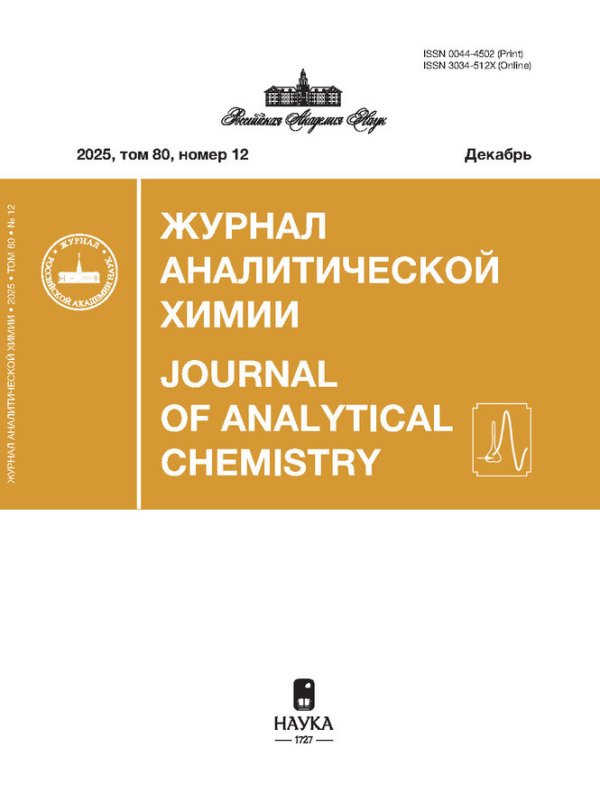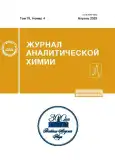Vol 78, No 4 (2023)
REVIEWS
Modern Methods and Current Trends in the Analytical Chemistry of Flavanones
Abstract
The review covers the specific features of the structure of flavanones and a critical review of methods for their determination in various samples. The data are summarizes according to the methods of analysis: chromatographic, electrophoretic, spectral, and electrochemical. Analytical possibilities of each group of methods and their advantages and disadvantages are discussed. Special attention is paid to the use of chemically modified electrodes based on carbon nanomaterials, 3D nanoporous metal structures, composites of metal oxides and sulfide nanoparticles or dyes with carbon nanomaterials, and also combinations of modifiers of various types in flavanone voltammetry.
 291-316
291-316


Using Smartphones in Chemical Analysis
Abstract
The review covers the current status and prospects for the development of digital colorimetry using a smartphone as a color recording device. The applications of the rapid analysis methodology for the control of environmental samples, biological fluids, food products, drugs, and some specific samples are systematized. Various approaches are considered, ensuring the formation of an analytical signal in digital colorimetry. The capabilities (advantages and disadvantages) of a smartphone equipped with various software products make it a universal, mobile, rapid, and sensitive tool in the analysis of various samples.
 317-353
317-353


ORIGINAL ARTICLES
Use of Magnetic Carbon Nanocomposites in the Formation of a Recognition Layer of a Piezoelectric Immunosensor for the Determination of Penicillin G
Abstract
Conditions for the formation of a recognition layer of a piezoelectric immunosensor based on magnetic carbon nanocomposites (MCNCs) under the action of an external magnetic field are studied. The effects of the size and number of magnetic nanoparticles (MNPs) in the composite on the analytical characteristics of the gravimetric immunosensor are revealed. Scanning electron microscopy is used to determine the average sizes of Fe3O4 magnetic nanoparticles synthesized by coprecipitation. It is noted that the minimum weight and stability of the recognition layer were observed for the nanocomposite obtained at a ratio of carbon nanotubes and MNPs with an average diameter of 22 nm equal to 3 : 1. The formation of peptide bonds between the MCNCs and a penicillin G conjugate was established by IR spectrometry. It was shown that the use of magnetic carbon nanocomposites in the formation of a recognition layer makes it possible to significantly simplify the procedure for preparing a piezoelectric sensor for analysis and reduce its duration from 24 to 1.5 h. The range of the determined antibiotic concentrations is 1–450 ng/mL, the limit of detection is 0.5 ng/mL.
 354-364
354-364


Chromatographic Assessment of the Concentration of Phenolic Compounds in Wild Chamomile (Matricaria chamomilla L.) Extracts Obtained under Various Extraction Conditions
Abstract
Results of a study of water and water–alcohol extracts of wild chamomile (Matricaria chamomilla L.) depending on the conditions of their extraction by different methods are discussed. The test samples are wild chamomile samples collected in various regions of Russia. Phenolic components in their native forms were extracted from medicinal raw materials using infusion, maceration, microwave-assisted, ultrasound-assisted, and subcritical extraction, and by the pharmacopoeial method. Concentrations of individual components and total phenolic compounds in wild chamomile were determined by chromatographic methods. The HPLC determination of phenolic compounds with diode-array and mass spectrometric detection was carried out using gradient elution with a mixture of acetonitrile with 0.1% formic acid. Chlorogenic acid, ferulic acid glycosides, luteolin-7-O-glucoside, dicaffeoylquinic and chicoric acid, apigenin-7-glucoside, and apigenin were identified in water and water–alcohol extracts of wild chamomile. The dependence of the concentration of phenolic compounds on the geographical place of the growth of plant raw materials was studied based on value of this parameter in extracts of wild chamomile samples from different territories. The maximum total concentration of phenolic compounds (10.1 mg/g) was found in the extract of chamomile from FarmaTsvet (Krasnogorsk, Moscow oblast).
 365-375
365-375


Chromatographic Determination of Diflubenzuron Residues in Agricultural Plant Matrices
Abstract
The article deals with the development of a method for the determination of diflubenzuron in agricultural products using HPLC with a diode array detector. The samples were extracted with acetonitrile, and then purified by solid-phase extraction using C18E and PSA adsorbents and a Diapak C cartridge. The developed method was tested on the green mass of plants, potato tubers, corn grain, soybeans, sunflower seeds, rapeseed, and vegetable oil in the concentration range from 0.025 to 0.25 mg/kg. The average values of recovery were 81–91% with an error of 1.3–2.3%.
 376-383
376-383


CRITIQUE AND BIBLIOGRAPHY
Новые книги издательства ROYAL SOCIETY OF CHEMISTRY
 384
384













